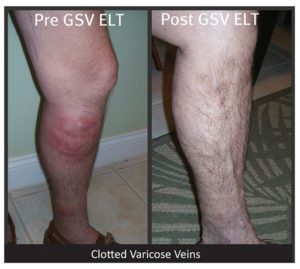By Joseph G. Magnant, MD, FACS, RPVI
 There are many different presentations of leg vein problems although the most recognizable is that of varicose veins.
There are many different presentations of leg vein problems although the most recognizable is that of varicose veins.
Other signs and symptoms of venous reflux disease (also known as venous insufficiency, CVI, venous incompetence or leaky veins) include swollen, achy legs, restless legs, night time leg cramps and urination, varicose veins, skin discoloration in the lower legs, and bleeding or ulcerations in the legs. Venous insufficiency is defined as failure of the valves in the veins to close tightly resulting in the backward flow of blood back down toward the feet. The end result is increased pressure in the veins in the lower legs and feet which causes water and protein to leak out into the surrounding tissues.
Over the past decade, our anatomic and physiologic understanding of venous insufficiency has been greatly improved as endovenous ablation (sealing of the veins) has been applied to patients with more varied signs and advanced stages of venous insufficiency with excellent results. Superficial veins other than the great saphenous vein, such as the small saphenous vein, intersaphenous vein, anterior accessory saphenous vein and perforating veins are now treatable with endovenous ablation. Modern ultrasound evaluation of the lower extremity venous system by experienced registered vascular sonographers can accurately identify which veins are leaking as well as the severity of the leak.
Ultrasound directed sealing of the abnormal veins under local anesthesia has yielded far superior results than vein ligation or stripping, which are no longer required nor should ever be considered. With the introduction of minimally invasive treatments for venous insufficiency in 2000, and the increased acceptance and application of this technology of sealing rather than stripping of the saphenous veins there is no need for patients to suffer from their symptoms related to venous disease any longer.
The following are the top 6 reasons patients should consider moving forward this fall and getting their leg vein problems treated.
1. Most insurance will cover your endovenous ablation. Vein Specialists will verify coverage prior to any procedures.
2. The snow birds have not taken over the roads and doctors’ waiting rooms…yet.
3. You have met your deductible for 2018 and have been meaning to have your legs evaluated.
4. The weather has finally cooled off .
5. You vowed that last summer was the LAST summer you were going to wear long pants to the beach to cover your legs.
6. You want to get your legs ready for that Christmas or New Year’s cruise (have to plan ahead!)
Patients likely to have venous insufficiency are those who have a family history of varicose veins, swollen legs or other signs of vein disease. Other risk factors for developing venous insufficiency are a history of pregnancy, obesity, sedentary occupations, advanced age, female gender and history of deep vein thrombosis or DVT. Patients may have varicose veins or other signs such as skin discoloration, brawny and thickened skin, diffuse spider veins in the lower leg and ankle regions, open or non-healing ulcerations or wounds, history of bleeding from veins, or swelling in the legs that is worse at the end of the day and improved with elevation.
Endovenous ablation or sealing of the leaking veins with catheters (laser, radiofrequency or VenaSeal™) offers a very safe, effective and minimally invasive option for patients once thought to be untreatable due to age, illness, or venous symptoms that were once thought not to be severe enough to subject the patient to stripping. Ultrasound evaluation for venous insufficiency is safe, effective, and offers a tremendous amount of physiologic and anatomic information which is critical in the decision making process. Vein Specialists is seeing record numbers of patients with the diagnosis of venous insufficiency, many of whom have obvious signs of venous disease such as leg swelling, skin changes, varicose veins or ulcerations as well as others who may not have obvious external signs of disease but who have severe venous reflux disease as the root cause of their symptoms. Since venous disease affects one out of five adults in the USA, it makes perfect sense to consider venous disease early in the course of your search for the cause of your leg symptoms.
If you or a loved one has signs or symptoms of venous insufficiency such as varicose or spider veins, leg swelling, fatigue, achiness, cramps or restless legs, please consider visiting our website at Weknowveins.com for more information. I see patients along with our highly trained advanced practitioners in our Fort Myers and Bonita Springs/ Naples locations daily so call
(239) 694-8346 for an appointment today.
Joseph G. Magnant,
MD, FACS, RPVI
Board Certified Vascular Surgeon
Trust your leg vein care to
Dr. Joseph G. Magnant & the Vein Specialists team.
. SWFL’s only IAC accredited vein centers (Fort Myers & Bonita Springs)
. More than 25,000 patients treated since 2006
. State of the art vein treatment techniques including Closurefast, Laser, VenaSealTM and Ivus
VEIN SPECIALISTS
239-694-VEIN(8346)
WeKnowVeins.com
1500 Royal Palm Square Blvd., Suite 105, Fort Myers, Florida
3359 Woods Edge Circle, Suite 102, Bonita Springs, Florida









